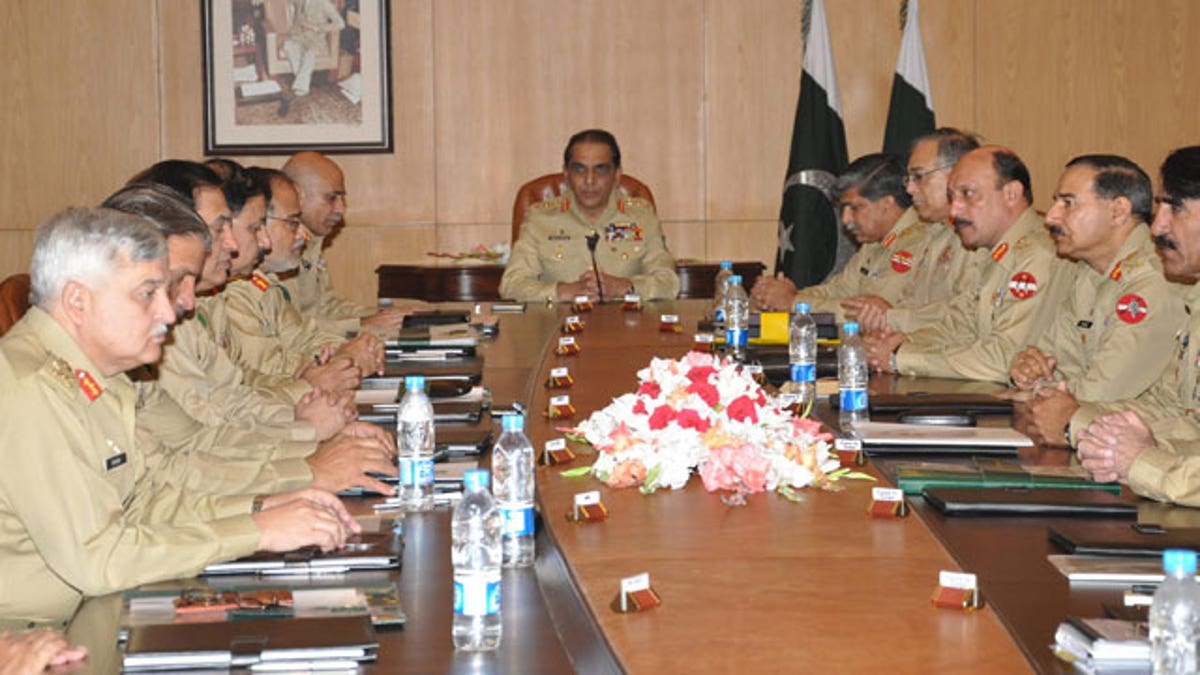
In this Thursday, May 5, 2011 photo provided by Inter Services Public Relation department, Pakistan's army chief General Ashfaq Parvez Kayani, center, presides the Corps Commander conference at General Headquarters in Rawalpindi, Pakistan. (AP)
Pakistan is calling for cuts in the U.S. military personnel inside the country after U.S. Navy SEALs killed Usama bin Laden in his Pakistan compound -- without Pakistan's help or prior knowledge.
The siege has only increased the strain on relations between the two countries, as some U.S. lawmakers are calling for cuts to the $1.3 billion in U.S. aid to Pakistan for its failure to locate bin Laden. The Al Qaeda leader was found and killed in a large $1 million compound in an army town not far from the capital of Islamabad. Lawmakers have suggested Pakistan was either too incompetent to catch bin Laden or was complicit in protecting him.
In a statement Thursday, Pakistan's army fired back, saying U.S. military personnel inside the country would be reduced to the "minimum essential" levels to protest the American commando raid that killed bin Laden early Monday local time. The army also threatened to cut cooperation with Washington if it stages more unilateral raids on its territory.
The U.S. military has no combat forces in Pakistan, but it does have a group of nearly 300 non-combat personnel within what's called the Office of Defense Representative, Pakistan. Members of this group essentially act as a liaison in the military-to-military relationship between the U.S. and Pakistan. For instance, this group played a critical role during the international flood relief efforts last year.
The statement from Pakistan's army was issued after a meeting of top generals. The statement gave no details on the numbers, and a spokesman declined to elaborate.
The statement said the Inter-Services Intelligence spy agency, or ISI, had given initial information to the CIA about bin Laden, but claimed the "CIA did not share further development of intelligence on the case with the ISI, contrary to the existing practice between the two services."
The raid on bin Laden has sharpened tensions between the two countries. Despite the calls from some U.S. lawmakers for cuts in aid to the country, the Obama administration and British Prime Minister David Cameron have indicated they would continue with their policy of engaging with the country.
"It is not always an easy relationship," U.S. Secretary of State Hillary Clinton said Thursday in Rome. "But on the other hand, it is a productive one for both of our countries and we are going to continue to cooperate between our governments, our militaries, our law enforcement agencies."
Some Republican lawmakers also advised against cutting aid to Pakistan.
"I think our aid should continue to Pakistan," House Speaker John Boehner said.
"Distancing ourselves from Pakistan would be unwise and extremely dangerous," said Sen. Richard Lugar, R-Ind.
But other lawmakers want answers to how bin Laden was able to live in such a large compound so close to the capital for six years.
"Who did they think was living behind those 15-foot walls?" Sen. John Kerry asked Thursday. "Was there any level of curiosity? How could bin Laden have gone undetected living next door to Pakistan's equivalent of West Point? All Americans and many other people are troubled by these questions."
Rep. Kay Granger, R-Texas, the chairwoman of the House State and Foreign Operations Appropriations Subcommittee, which has jurisdiction over aid to Pakistan, sent a letter to Clinton expressing her "concerns during this time of immense uncertainty about our country's relationship with Pakistan."
Granger says she is troubled about the U.S. sending $190 million to help with flood assistance in Pakistan. She also said that her worries about Pakistani aid "has only been heightened by the discovery of the most notorious terrorist in the world living hundreds of yards from a Pakistani military installation for more than five years."
"This reinforces my greater concern that the government may be incapable of distributing U.S. funds in a transparent manner that allows proper oversight of taxpayer dollars," she wrote.
The Associated Press contributed to this report.












































